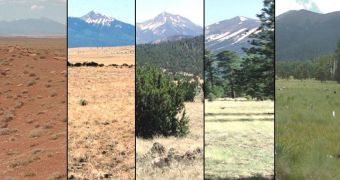Given that plants thrive on atmospheric carbon dioxide, one would expect CO2-induced global warming to benefit vegetation around the world. However, a new research demonstrates that climate change promotes plant growth only to halt it to a near halt afterwards.
Details of how this feedback mechanism operates were published in the latest issue of the top scientific journal Nature Climate Change. Researchers explain that the early stages of a warming ecosystem are very beneficial to plants.
But the positive effect is quickly lost as the phenomenon advances. As temperatures continue to rise, plants begin to deteriorate at an accelerating pace, say investigators from the Northern Arizona University (NAU).
Lead study author, NAU scientist Zhuoting Wu, says that “we were really surprised by the pattern, where the initial boost in growth just went away. As ecosystems adjusted, the responses changed.”
Plants need CO2 in order to conduct photosynthesis, the process that enables them to transform nutrients from the soil into energy. It requires water and carbon dioxide, which are turned into oxygen and energy, in the presence of sunlight.
The NAU investigation spanned a decade. During this time, four grassland ecosystems were subjected to conditions such as those we could expect to see if the current global warming trend continues. During the first year of treatment, plants thrived in all ecosystems.
However, during the next 9 years, they began to decline at a fast pace, until they were entirely gone. “The plants and animals around us repeatedly serve up surprises,” Saran Twombly explains.
The official holds an appointment as a program director in the National Science Foundation (NSF) Division of Environmental Biology. The DEB provided the funds needed for this research effort.
“These results show that we miss these surprises because we don't study natural communities over the right time scales. For plant communities in Arizona, it took researchers 10 years to find that responses of native plant communities to warmer temperatures were the opposite of those predicted,” she adds.
What this study does is destroy the widely held belief that global warming will promote sustained plant growth, while at the same time increasing nitrogen availability in soils around the world.

 14 DAY TRIAL //
14 DAY TRIAL //